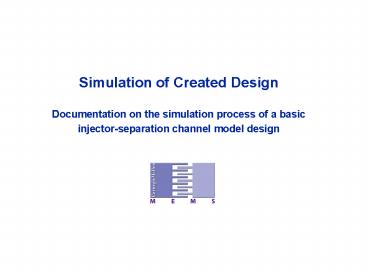Simulation of Created Design - PowerPoint PPT Presentation
Title:
Simulation of Created Design
Description:
Selecting the Pin ... When the conc 0:1 pin is clicked a box pops up ... Change in the mobilities might separate or reduce the space between the two species ... – PowerPoint PPT presentation
Number of Views:16
Avg rating:3.0/5.0
Title: Simulation of Created Design
1
- Simulation of Created Design
- Documentation on the simulation process of a
basic - injector-separation channel model design
2
The Simulation Process
- In this simulation, a sample will be passed
into the injector, and Injected into the
separation channel - This is where the different species of the
product will begin to separate from each other - A signal of when each species passes a detector
will be taken and plotted
3
Getting to the Simulation Window
- In order to simulate the design, the simulation
window named Cadence Analog Design Environment
needs to be opened - To do this, go into the toolbar menu Tool-gt
Analog Environment
4
Getting Variables
- The Variables that were used when adding the
objects need to be added into the simulation
variables - This is done by selecting Variables -gt Copy From
Cellview from the toolbar, this will pick all the
variables in the schematic
5
Editing Variables - I
- Now the values of those variables need to be
changed - To change them select Variables -gt Edit from the
toolbar, or click on the following side toolbar
button
6
Editing Variables - II
- To change the values, type the value into the
Value (Expr) field and click on Change - Then select the Next variable from the table and
continue - Enter the following table of values, V1D and V3D
- need to be close to V4D value to prevent much
of a voltage difference between the two
V4L 12.5
V4D 3000
V3L 0
V3D 2900
V2L 52.5
V2D 0
V1L 22
V1D 2900
mu0 50000
mu1 40000
LOAD 0
D1 400
D0 400
7
Selecting Outputs
- In order to neatly see the results from the
simulation, outputs are needed - To select output, in the toolbar menu, go to
- Outputs -gt To Be Plotted -gt Select On
Schematic - This will open up the schematic window again
8
Selecting the Pin
- In the Editor window, the values of wire that is
selected will be plotted in a graph when the
simulation is run - So, select the conclt01gt output pin on the
first detector and the conc_outlt01gt output pin
on the second detector
9
Output Plots
- When the conclt01gt pin is clicked a box pops up
and when it is clicked again, conclt0gt and conclt1gt
get highlighted, click OK, the two come under
Outputs follow the same procedure for conc_out
too
10
Choosing the Analysis
- To select the simulation type, click on the
Choose Analyses... button on the side toolbar
11
The DC Analysis
- In the Choosing Analyses window, select dc,
Enabled, and Save DC Operating Point and click OK
12
The First Simulation
- Once all the values have been inputted, click on
the toolbar menu Simulation-gtNetlist and Run on
the toolbar menu or click the Netlist and Run
button on the side toolbar
13
The Log File
- After this simulation has been run, a log file
will appear - This file is the results of the simulation and
has some values that need to be inputted into the
design
14
Edit the Properties
- Some properties of the injector need to be
changed - To do this go to Edit -gt Properties -gt Objects
q
15
Editing Properties
- Input the values from the log file of the
currents and concentrations into the
corresponding properties of the injector, i.e., - current 1 cur_I1 etc
- One change that needs to be done to the values is
that they should all be inputted as positive
numbers
16
Another Analysis
- Another Analysis needs to be done, so go to the
Choose Analyses Window again
17
Transient Simulation
- In the Choosing Analyses Window, Select tran
and Enabled, then set the Stop Time to 1.5,
check conservative, and click the Options...
button
18
Editing the Transient Simulation
- In this window, Set the start field to 0, and set
the values of the step and maxstep fields to
.001 - Then click OK and get back to the simulation
Window
19
Simulating
- Once all of the values are inputted, the only
thing left to do is to simulate - This can be done by clicking on the Netlist and
Run on the side toolbar button - This simulation may take a little longer than the
previous one
20
The Final Output
- After the Simulation finishes, a Waveform
Window will appear with the desired plot on it - This plot shows the outputs at the selected pin
21
Understanding the plot
- Click on the Curves-gt Edit and we will be able to
set some outputs to off and on to better
understand the plot - Increase the number of data points by going to
Cadence Analog Environment window selecting
Analysis in the side toolbar and clicking Options
and changing the step and max step to get a more
accurate plot - Changing the voltages may increase or decrease
the time the species tested need to approach the
detector - Change in the mobilities might separate or reduce
the space between the two species
22
Finishing up
- Now we will save the current state of the
simulation - Go to Session-gtSave State and save it as state2
23
Finishing up
- Now we can close all the open windows































